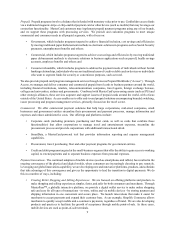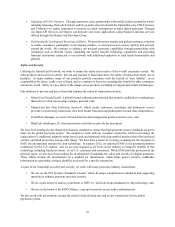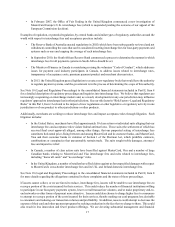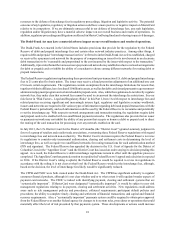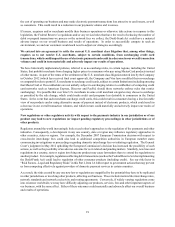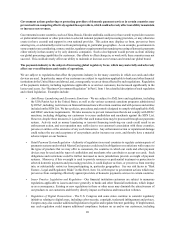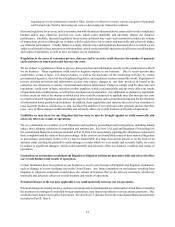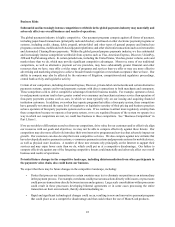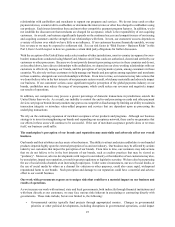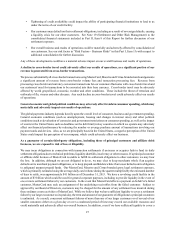MasterCard 2013 Annual Report Download - page 23
Download and view the complete annual report
Please find page 23 of the 2013 MasterCard annual report below. You can navigate through the pages in the report by either clicking on the pages listed below, or by using the keyword search tool below to find specific information within the annual report.19
the cost of operating our business and may make electronic payment transactions less attractive to card issuers, as well
as consumers. This could result in a reduction in our payments volume and revenues.
If issuers, acquirers and/or merchants modify their business operations or otherwise take actions in response to this
legislation, the Federal Reserve’s regulations and/or any revised rules that have the result of reducing the number of
debit or prepaid transactions we process or the network fees we collect, the Dodd-Frank Act could have a material
adverse impact on our overall business and results of operations. In order to successfully compete in such an
environment, we and our customers would each need to adjust our strategies accordingly.
We entered into an agreement to settle the current U.S. merchant class litigation that, among other things,
requires us to not restrict U.S. merchants, subject to certain conditions, from surcharging credit card
transactions, which could impact the use of electronic payments and result in a decrease in our overall transaction
volumes and could in turn materially and adversely impact our results of operations.
We have historically implemented policies, referred to as no-surcharge rules, in certain regions, including the United
States, that prohibit merchants from charging higher prices to consumers who pay using MasterCard products instead
of other means. As part of the terms of the settlement of the U.S. merchant class litigation entered into by the Company
in October 2012 (which has received final court approval), the Company and Visa have modified their no-surcharge
or comparable rules to permit U.S. merchants to surcharge credit cards, subject to certain limitations (including ensuring
that MasterCard or Visa cardholders are not unfairly subject to surcharging relative to cardholders of competing credit
card networks such as American Express, Discover and PayPal, should those networks enforce rules that restrict
surcharging). It is possible that over time U.S. merchants in some or all merchant categories may choose to surcharge
as permitted by the rule change, which could make credit card programs less desirable to consumers in the United
States. In the event that such merchants surcharge credit cards, this could result in consumers having a less favorable
view of our products and/or using alternative means of payment instead of electronic products, which could result in
a decrease in our overall transaction volumes, and which in turn could materially and adversely impact our results of
operations.
New regulations or other regulatory activity with respect to the payments industry in one jurisdiction or of one
product may lead to new regulations (or impact pending regulatory proceedings) in other jurisdictions or of
other products.
Regulators around the world increasingly look at each other's approaches to the regulation of the payments and other
industries. Consequently, a development in any one country, state or region may influence regulatory approaches in
other countries, states or regions. For example, the December 2007 European Commission decision with respect to
cross-border interchange fees could also lead to additional competition authorities in European member states
commencing investigations or proceedings regarding domestic interchange fees or initiating regulation. The General
Court’s judgment in May 2012 upholding the European Commission’s decision has increased the possibility of such
actions, as well as the possibility of an adverse outcome for us in related and pending matters. Similarly, new laws and
regulations in a country, state or region involving one product may cause lawmakers there to extend the regulations to
another product. For example, regulations affecting debit transactions (such as the Federal Reserve's rules implementing
the Dodd-Frank Act) could lead to regulation of other consumer products (including credit). See our risk factor in
“Risk Factors - Legal and Regulatory Risks” in this Part I, Item 1A with respect to government actions that may prevent
us from competing effectively against providers of domestic payment services in certain countries.
As a result, the risks created by any one new law or regulation are magnified by the potential they have to be replicated
in other jurisdictions or involving other products, affecting our business. These include matters like interchange rates,
network standards and network exclusivity and routing agreements. Conversely, if widely varying regulations come
into existence worldwide, we may have difficulty adjusting our products, services, fees and other important aspects of
our business, with the same effect. Either of these outcomes could materially and adversely affect our overall business
and results of operations.


